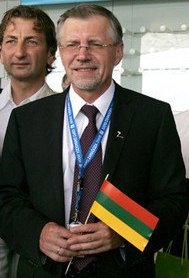Industrial group Siemens AG won't move 2,000 phone assembly jobs from northwest Germany to lower-wage Hungary
Published:
26 June 2004 y., Saturday
Industrial group Siemens AG won't move 2,000 phone assembly jobs from northwest Germany to lower-wage Hungary, now that workers have agreed to lengthen their work week to 40 hours from 35 for no more money, the company said Thursday.
The agreement with the IG Metall union specifies that workers at the Bocholt and Kamp-Lintfort facilities must work an average of 1,760 hours a year measured over a two-year period. Excluding vacation and holidays, that amounts to an average 40-hour week, and permits the company to gear up when there's more work and have people work less when it's slow.
"The solution for Kamp-Lintfort and Bocholt is a triumph of reason," said Siemens CEO Heinrich von Pierer, who has said the facilities must cut costs or see jobs move east. "Our employee representatives, IG Metall and our company management have show that there are realistic ways to counteract job cuts in Germany."
The agreement, struck between the industrial employers' association and IG Metall, takes effect July 1 and guarantees the jobs of the covered workers at the two plants - more than 4,000 in all - who assemble mobile and cordless phones.
Šaltinis:
thestate.com
Copying, publishing, announcing any information from the News.lt portal without written permission of News.lt editorial office is prohibited.
The most popular articles
 In Brussels, Prime Minister Gediminas Kirkilas participated in the meeting of Nordic and Baltic (NB6) Prime Ministers which focused on the pressing topics on the agenda of the European Council: global finance crisis, energy, climate change, EU-Russia relations, and financial situation in Iceland.
more »
In Brussels, Prime Minister Gediminas Kirkilas participated in the meeting of Nordic and Baltic (NB6) Prime Ministers which focused on the pressing topics on the agenda of the European Council: global finance crisis, energy, climate change, EU-Russia relations, and financial situation in Iceland.
more »
 Prime Minister Gediminas Kirkilas attended the working dinner with President of the European Commission José Manuel Barroso, Danish, Estonian, Finnish, Latvian, Polish Prime Ministers – Anders Fogh Rasmussen, Andrus Ansip, Matti Vanhanen, Ivars Godmanis, Donald Tusk – and Swedish Minister of Foreign Affairs Carl Bildt.
more »
Prime Minister Gediminas Kirkilas attended the working dinner with President of the European Commission José Manuel Barroso, Danish, Estonian, Finnish, Latvian, Polish Prime Ministers – Anders Fogh Rasmussen, Andrus Ansip, Matti Vanhanen, Ivars Godmanis, Donald Tusk – and Swedish Minister of Foreign Affairs Carl Bildt.
more »
 The European Commission has put forward a revision of EU rules on deposit guarantee schemes that puts into action the commitments made by EU Finance Ministers on 7 October.
more »
The European Commission has put forward a revision of EU rules on deposit guarantee schemes that puts into action the commitments made by EU Finance Ministers on 7 October.
more »
 The United States began releasing long-awaited details of its $700 billion rescue plan.
more »
The United States began releasing long-awaited details of its $700 billion rescue plan.
more »
 Australia's Prime Minister announces plans for the government to guarantee bank deposits for the next three years.
more »
Australia's Prime Minister announces plans for the government to guarantee bank deposits for the next three years.
more »
 Ethical bank, Triodos, says it is offering customers an alternative way to invest their funds.
more »
Ethical bank, Triodos, says it is offering customers an alternative way to invest their funds.
more »
 Energy security was the dominant theme during the meeting between Lithuanian Prime Minister Gediminas Kirkilas and Latvian Prime Minister Ivars Godmanis.
more »
Energy security was the dominant theme during the meeting between Lithuanian Prime Minister Gediminas Kirkilas and Latvian Prime Minister Ivars Godmanis.
more »
 The draft law would require utilities to separate – or unbundle – the distribution of electricity and gas from production.
more »
The draft law would require utilities to separate – or unbundle – the distribution of electricity and gas from production.
more »
 A holistic approach to eradicating poverty, which seeks to ensure adequate incomes, quality jobs and better access to social services, is advocated by the EP in an own-initiative report.
more »
A holistic approach to eradicating poverty, which seeks to ensure adequate incomes, quality jobs and better access to social services, is advocated by the EP in an own-initiative report.
more »
 Dubai showcases multi-billion dollar development projects at the annual Cityscape exhibition.
more »
Dubai showcases multi-billion dollar development projects at the annual Cityscape exhibition.
more »